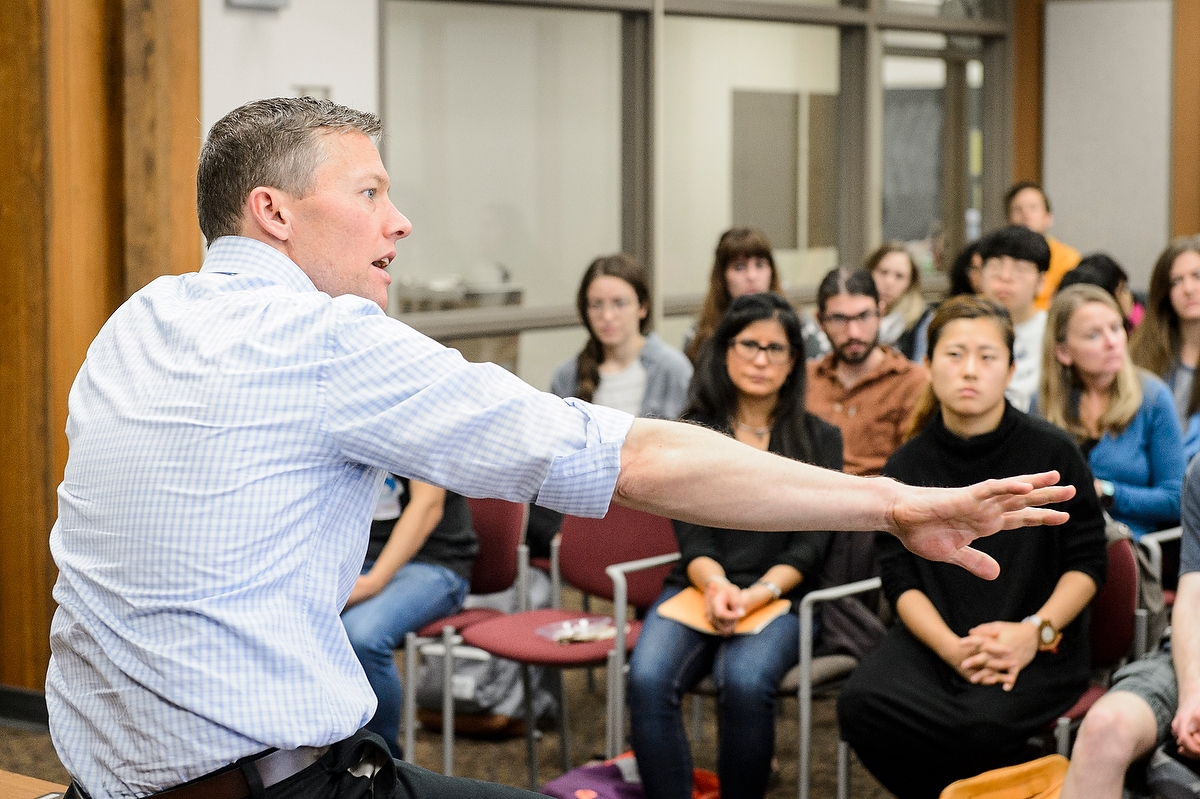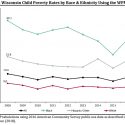UW-Madison alumnus, Go Big Read author at head of class

Go Big Read author and sociologist Matthew Desmond speaks to students and faculty Wednesday. Photo: Bryce Richter
As a graduate student, Matthew Desmond spent countless hours in class at the Sewell Social Sciences Building. On Wednesday morning, he was at the front of the class, leading a discussion about his book “Evicted: Poverty and Profit in the American City.”
The book is this year’s Go Big Read selection and on Tuesday night, Desmond spoke to more than 1,000 people at Shannon Hall in the Memorial Union. His Wednesday morning discussion was much more intimate, with an audience made up mostly of sociology graduate students and faculty.
At the heart of the discussion was how sociologists can communicate their work to large audiences.
“Especially those of us who work on a problem for a long, long time — our answers can be complicated and nuanced, and sometimes that’s not going to fly when we’re trying to communicate the bigger picture,” Desmond said.
Desmond received his doctorate from UW–Madison in 2010. He is an associate professor of sociology and social studies at Harvard University and an affiliate of the Institute for Research on Poverty at the UW. In 2015, he received a MacArthur “genius” grant.
“Evicted” tells the stories of eight Milwaukee families faced with losing their homes. It’s also a powerful analysis of a little-known epidemic affecting people across the country living in poverty.
In his book, Desmond writes that in the early 20th century, evictions in the U.S. were somewhat rare and popularly contested. Now they have become a frequent occurrence for low-income families, especially those headed by black women.
Desmond discussed his research process and the intricacies of negotiating his role as a sociologist while getting to know the subjects of his research. To ensure accuracy, he hired a fact checker to go through his entire book.
“That was a really helpful process,” Desmond said. “I just wanted to make sure I got everything right. That was important to me. If you have a message like this and you get something wrong, that’s the story.”
He also emphasized the importance of good writing, remembering his days as a graduate student when he thought you had to be in the right mood and location for writing — and then you just wrote for a couple of hours.
“To write a lot you have got to write a lot. You have to write when you’re tired. When you have a headache. When you’re not in the mood. When you’re on a train or plane,” Desmond said. “You have to try to expand the capacity to write.”
The emphasis on writing resonated with Paulina Garcia Del Moral, a postdoctoral fellow.
“As a recent Ph.D., this is what I aspire to,” she said. “We’re all scared of the blank page. Becoming a better writer is an important part of who we are as academics.”
David Skalinder, a graduate student studying sociology, said hearing Desmond talk was a great example of the Wisconsin Idea in action.
“He’s one reason I came here,” Skalinder said. “For me, this is extra training in how to do this. It’s exactly the right book and research for what’s happening right now.”
For Courtney Deisch, a graduate student in sociology, hearing Desmond speak passionately about “Evicted” added to the impact of reading the book and gave her ideas about her own work.
“We read a lot of very theoretical work. This is more written in a way that’s accessible to the general public,” she said. “This is a public problem and we need public discourse. And I think this book bridges that gap and makes it accessible to policymakers.”
The common-reading program aims to engage students, faculty, staff and the entire community around issues that matter from a range of perspectives. The book has been popular, with 222 UW–Madison classes using it as part of their curriculum. All freshmen received a copy of the book at convocation.
Go Big Read has a history of choosing timely topics that are part of the national discussion. Last year’s Go Big Read book, “Just Mercy” by Bryan Stevenson, highlighted racial inequality and the need to reform America’s justice system.
The Go Big Read program is an initiative of the Office of the Chancellor. For more information, visit https://gobigread.wisc.edu.



